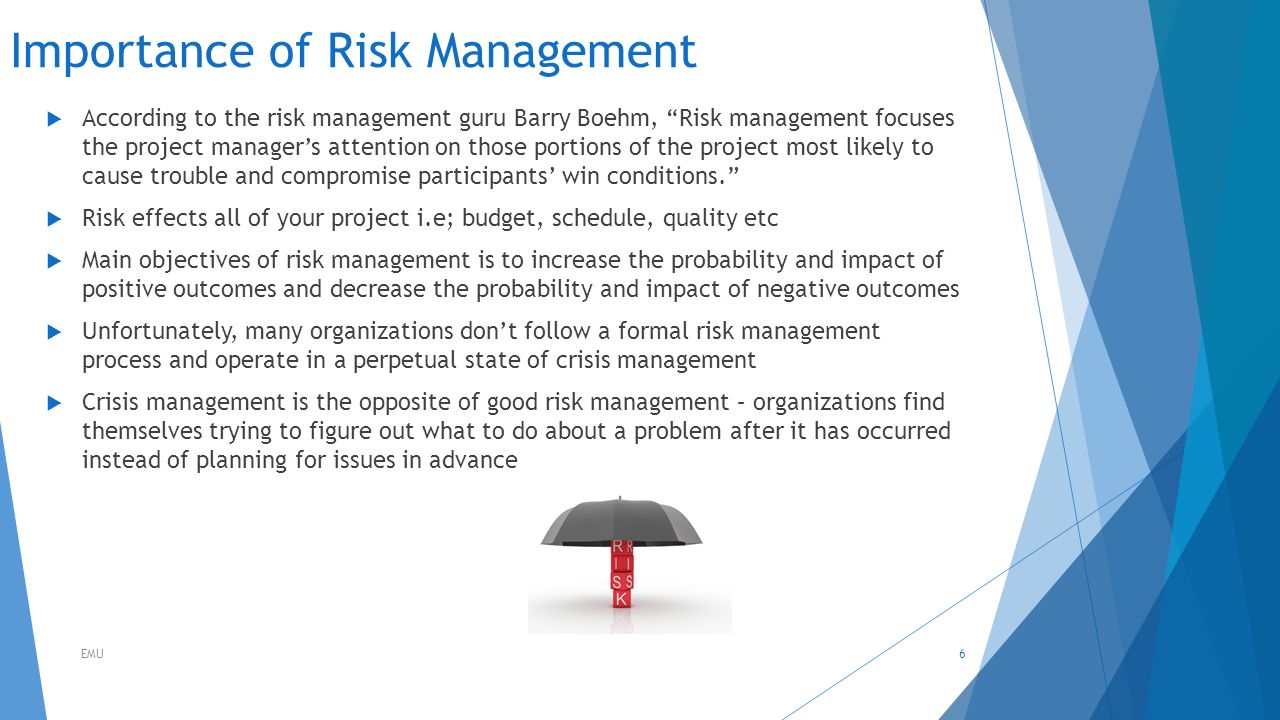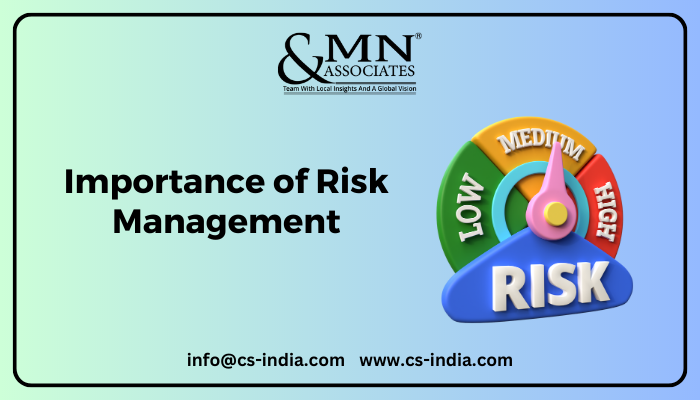Checking out the Importance of Risk Management for Effective Decision-Making Methods
In the complex world of organization, Risk Management emerges as a vital variable in the decision-making procedure. The ability to identify prospective dangers and possibilities, and plan accordingly, can spell the difference between success and failing.
Recognizing the Principle of Risk Management
Risk Management, a vital part in decision-making, is often misinterpreted or oversimplified. Generally, it describes the recognition, examination, and prioritization of threats to minimize, monitor, and control the likelihood or effect of regrettable events. It's not just regarding stopping unfavorable results, however likewise about recognizing possible chances. Risk Management involves structured and self-displined techniques, utilizing information and informative assessments. It requires an extensive understanding of the company's context, objectives, and the prospective threats that can obstruct them. From monetary uncertainties, lawful liabilities, strategic Management errors, to accidents and all-natural disasters, it resolves different risks. Notably, efficient Risk Management is not stationary; it's a continual, forward-looking procedure that progresses with changing circumstances.
The Role of Risk Management in Decision-Making Processes
In the world of strategic planning and organization operations, Risk Management plays an indispensable role in decision-making processes. It helps in recognizing potential risks and unpredictabilities that can affect the achievement of company objectives. By tracing these dangers, business can create strategies to reduce their influence, ensuring company continuity and security. Risk Management therefore ends up being a vital tool in decision-making, helping leaders to make informed choices based on a detailed understanding of the threats entailed. It encourages a proactive approach, allowing organizations to prepare and expect for feasible future situations. This dramatically reduces the likelihood of negative consequences, advertising extra reliable and reliable decision-making methods. Risk Management offers as a vital element in the decision-making processes of any kind of organization.

How Risk Management Enhances Strategic Preparation
In the context of critical preparation, Risk Management plays a critical role. Launching with the recognition of prospective risks, it further encompasses the application of Risk mitigation measures. The duty of Risk Management is not static yet dynamic, as it demands continuous monitoring and adjusting of strategies.
Recognizing Potential Threats

Implementing Risk Reduction
Risk reduction techniques can vary from Risk evasion, Risk transfer, to run the risk of reduction. Each method ought to be tailored to the specific Risk, considering its potential influence and the organization's Risk resistance. Efficient Risk mitigation needs a deep understanding of the Risk landscape and the prospective impact of each Risk.
Surveillance and Adjusting Methods
Though Risk reduction is a crucial action in critical preparation, constant tracking and modification of these methods is similarly essential. It also provides an opportunity to review the success of the Risk Management measures, enabling modifications to be made where necessary, further boosting calculated planning. Monitoring and readjusting Risk Management strategies is a critical part for enhancing an organization's strength and calculated planning.
Case Researches: Successful Risk Management and Decision-Making
On the planet of business and money, effective Risk Management and decision-making frequently act as the pillars of flourishing ventures. One such entity is an international oil company that mitigated economic loss by hedging versus varying oil prices. In another circumstances, a technology startup prospered by identifying and approving high-risk, high-reward techniques in an unpredictable market. An international bank, confronted with governing uncertainties, successfully browsed the circumstance with proactive Risk assessment and vibrant right here decision-making. These situations highlight the value of sharp Risk Management in decision-making processes. It is not the lack of Risk, yet the Management of it, that commonly differentiates effective business from unsuccessful ones. These cases underscore the essential duty of Risk Management in tactical decision-making. importance of risk management.
Devices and Methods for Efficient Risk Management
Browsing the complex puzzle of Risk Management calls for the best collection of tools and methods. These devices, such as Risk registers and warm maps, help in recognizing and assessing prospective threats. Techniques include both measurable approaches, like sensitivity analysis, and qualitative techniques, such as SWOT evaluation. These aid in prioritizing risks based on their possible influence and chance. Risk reaction approaches, a key component of Risk Management, involve accepting, preventing, transferring, or mitigating risks. Tracking and managing dangers, via address normal audits and testimonials, make certain that the strategies remain effective. With these techniques and tools, decision-makers can navigate the complex landscape of Risk Management, therefore helping with notified and efficient decision-making.
Future Trends in Risk Management and Decision-Making Approaches
As we check out the vast landscape of Risk Management, it comes to be apparent that the tools and strategies made use of today will proceed to develop. The idea of Risk culture, where every member of a company is conscious and entailed in Risk Management, will acquire a lot more importance. These fads herald a more comprehensive and positive strategy in the direction of Risk Management and decision-making.
Conclusion

Risk Management hence ends up being a crucial tool in decision-making, helping leaders to make enlightened options based on an extensive understanding of the risks entailed. Risk mitigation strategies can range from Risk avoidance, Risk transfer, to take the chance of reduction (importance of risk management). Effective Risk reduction requires a deep understanding of the Risk landscape and the potential influence of each Risk. Risk reaction methods, an essential element of Risk Management, involve approving, avoiding, transferring, or mitigating risks. The idea of Risk society, where every member of a company is aware and entailed in Risk Management, will certainly acquire a lot more prominence